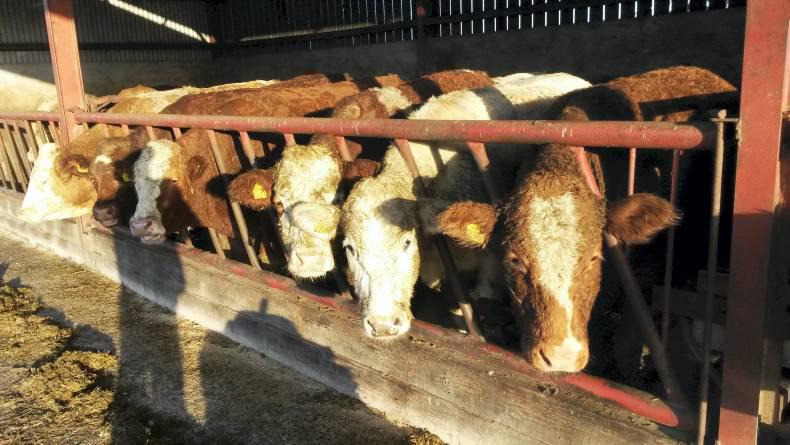Cattle exporters are studying a tender opened by Turkey’s Meat and Milk Board for young cattle. It is inviting tenders for 50,000 head from the EU over coming months, as well as 50,000 from South America. It is the first tender by the board, which has taken over importing of live cattle. Tariffs have been raised sharply on cattle imported independently by private traders.
The tender specifies male cattle of beef breed aged under 12 months and weighing under 300kg. The closing date is Monday 18 July. This will be followed by weeks of negotiations, after which successful bidders will have up to 50 days in which to quarantine and deliver animals. The timing suits the start of weanling sales here in early September.
It’s positive that half of the overall tender has been earmarked for EU cattle. “We will not be competing with South America where cattle are lower quality and cheaper,” one exporter said. With Turkey requiring up to 400,000 live cattle in 2016, a second tender could open in mid-autumn.
However, a number of the conditions are challenging:
The board will agree deals for batches of 10,000 head – too large for most Irish exporters. They could band together to make a bid. Alternately, exporters could link up with a European or Turkish agent who would submit the bid and fill it with animals from a number of countries. But Irish exporters would rather deal one-to-one with Turkish importers for smaller deliveries.Payment will be made after the animals are delivered to Turkey. In some other markets, importers pay for stock before delivery, in staged payments.Successful bidders must lodge a security with theboard equal to 3% of the value of the cattle. On 1,000 cattle, that would be about €30,000. Cattle will be weighed for payment at point of arrival. Exporters would rather cattle were weighed here before loading. Cattle can be delivered by boat or specialist truck. Exporters who purchased young cattle for Turkey in May may eventually get to send some of them there. Some have been sold to finishers, some exported to Italy, while other younger animals remain eligible for Turkey.
The farm organisations welcomed the news. “Ireland is in a strong position as we have an abundant supply of suitable quality stock,” IFA livestock chair Angus Woods said.
State agencies, including the Department of Agriculture, must now help Ireland get part of this tender, said Michael Guinan, ICMSA livestock chair.
Cattle exporters are studying a tender opened by Turkey’s Meat and Milk Board for young cattle. It is inviting tenders for 50,000 head from the EU over coming months, as well as 50,000 from South America. It is the first tender by the board, which has taken over importing of live cattle. Tariffs have been raised sharply on cattle imported independently by private traders.
The tender specifies male cattle of beef breed aged under 12 months and weighing under 300kg. The closing date is Monday 18 July. This will be followed by weeks of negotiations, after which successful bidders will have up to 50 days in which to quarantine and deliver animals. The timing suits the start of weanling sales here in early September.
It’s positive that half of the overall tender has been earmarked for EU cattle. “We will not be competing with South America where cattle are lower quality and cheaper,” one exporter said. With Turkey requiring up to 400,000 live cattle in 2016, a second tender could open in mid-autumn.
However, a number of the conditions are challenging:
The board will agree deals for batches of 10,000 head – too large for most Irish exporters. They could band together to make a bid. Alternately, exporters could link up with a European or Turkish agent who would submit the bid and fill it with animals from a number of countries. But Irish exporters would rather deal one-to-one with Turkish importers for smaller deliveries.Payment will be made after the animals are delivered to Turkey. In some other markets, importers pay for stock before delivery, in staged payments.Successful bidders must lodge a security with theboard equal to 3% of the value of the cattle. On 1,000 cattle, that would be about €30,000. Cattle will be weighed for payment at point of arrival. Exporters would rather cattle were weighed here before loading. Cattle can be delivered by boat or specialist truck. Exporters who purchased young cattle for Turkey in May may eventually get to send some of them there. Some have been sold to finishers, some exported to Italy, while other younger animals remain eligible for Turkey.
The farm organisations welcomed the news. “Ireland is in a strong position as we have an abundant supply of suitable quality stock,” IFA livestock chair Angus Woods said.
State agencies, including the Department of Agriculture, must now help Ireland get part of this tender, said Michael Guinan, ICMSA livestock chair.






 This is a subscriber-only article
This is a subscriber-only article










SHARING OPTIONS: